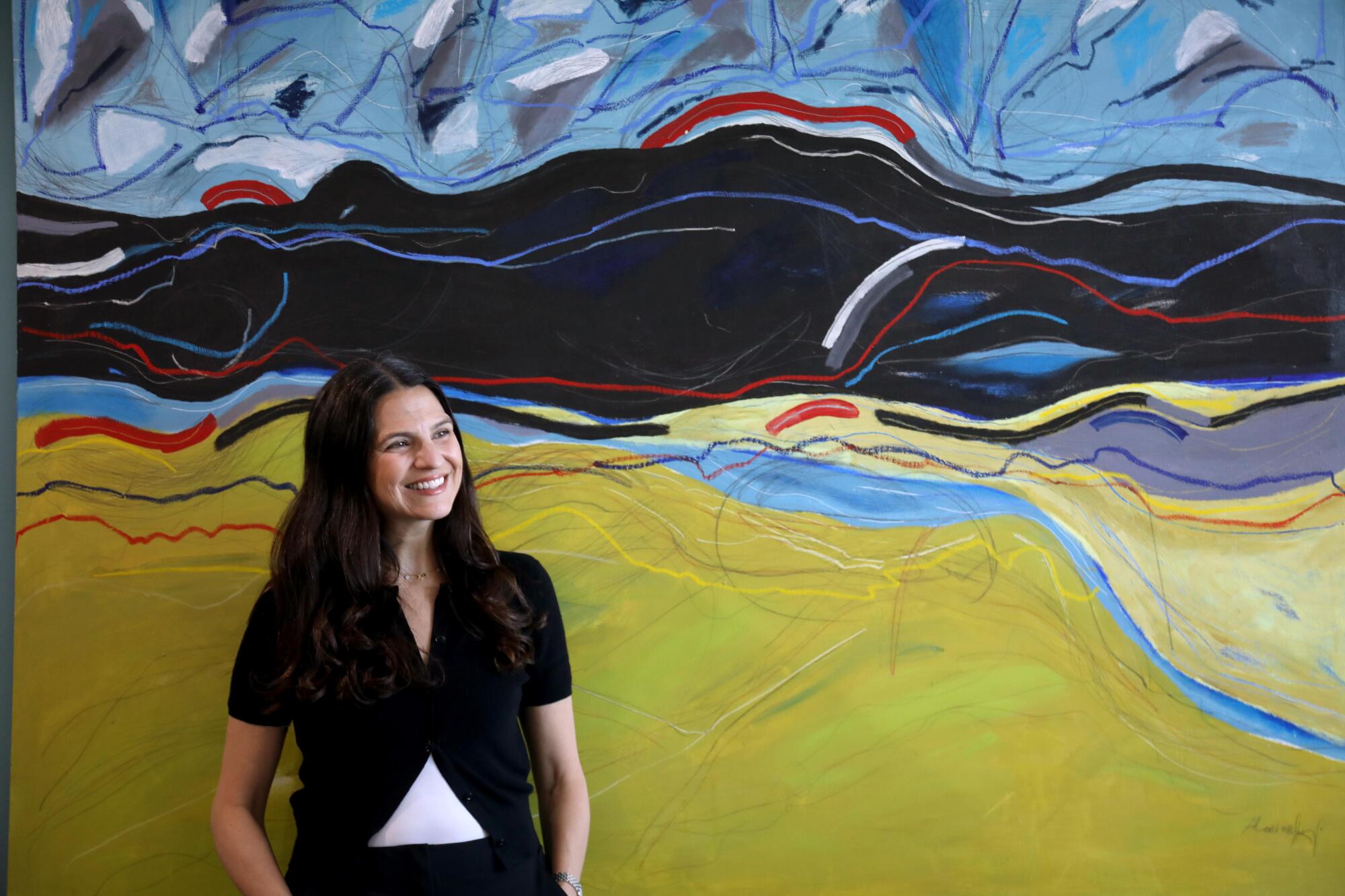
She was a clever girl, a daughter of retailers, who thought she had been born too late. The civil rights and antiwar movements of the 1960s inspired her. But Sharon Brous grew up in the age of Reagan, hedge funds and indifference. By the time she reached rabbinical school, Brous had many questions. All of them big and centering on how the Torah could mend a modern world of wars, poverty, racism and spiritual despair.
Brous wanted to draw sacred texts into immediate action to heal suffering. “The choice I had made to dwell in the past of ancient wisdom and my Jewish tradition,” she said of her years at the Jewish Theological Seminary, “had actually made it so that I was complicit in whatever horrors were unfolding in the world because I wasn’t doing anything to stop it.”
That may have been a harsh judgment for someone then in her 20s, but Brous has emerged as one of America’s leading Jewish voices. Her sermons on human rights and social justice are at once a compassionate and fierce plea for a planet in disarray. The growing congregation she founded in Los Angeles in 2004, known as IKAR, is recasting Jewish life in a mission of shared purpose, whether helping a friend in a time of grief or responding to genocide in Darfur or homelessness in Southern California.
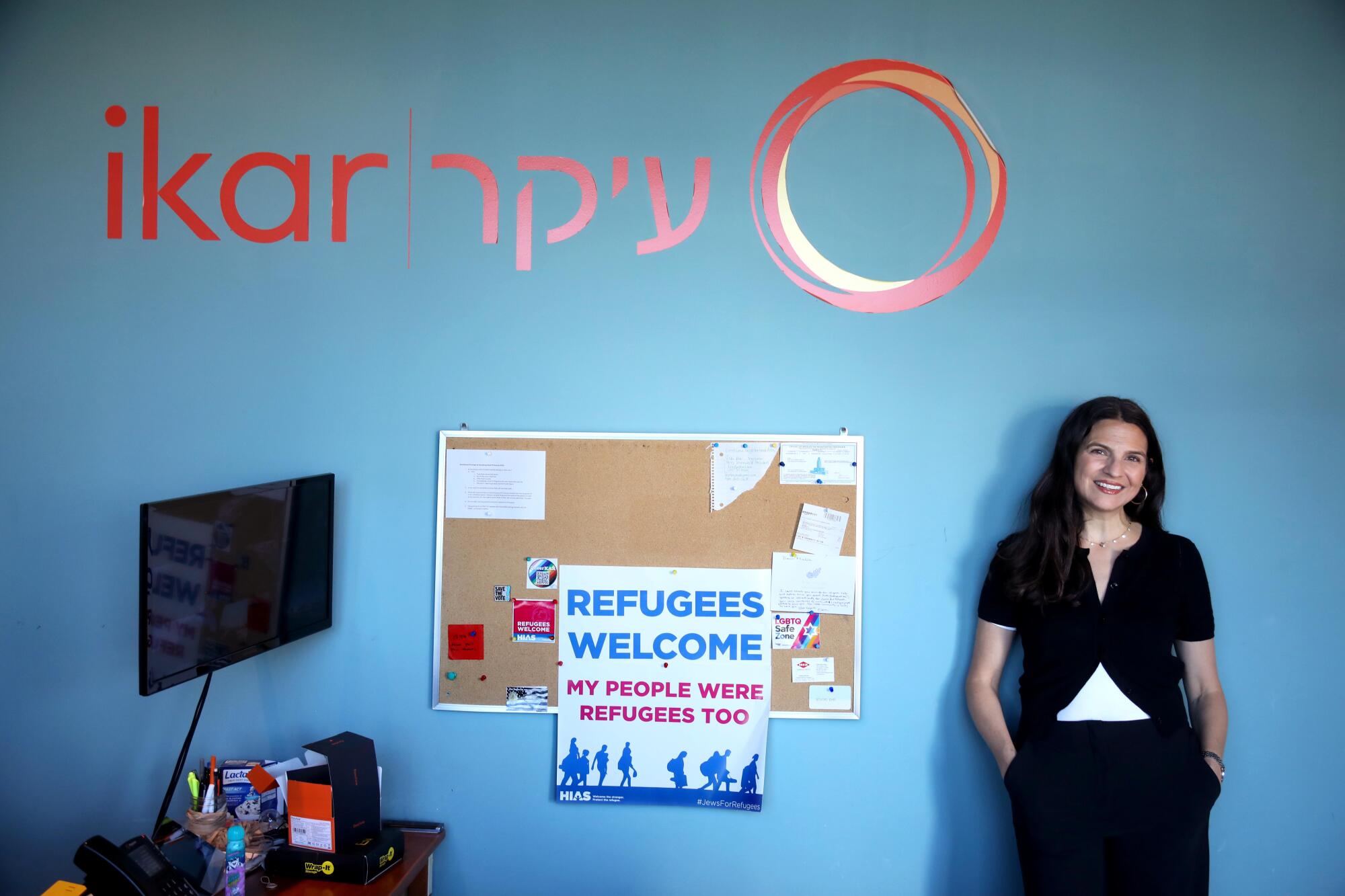
“You cannot build a loving community out in the world unless you build a loving community inside,” says Brous, 50, who was raised as a Reform Jew. “I’m not interested in the denominational question. I want people who are really curious about what it means to be a Jew and a human being in a world on fire.”
Brous has been most provocative — she has received death threats over the years — in her condemnation of Israel’s right-wing government and its treatment of Palestinians. “Supporting Israel’s right to protect and defend itself,” she said in 2012, “does not diminish the reality that the Palestinian people are also children of God whose suffering is real and undeniable.” In a Yom Kippur sermon last year, just days before Hamas’ Oct. 7 attack on Israel, Brous said “the marriage of messianic fervor” of Israel’s radical religious right with “state power is a recipe for extreme violence, abuse of power, and ultimately, I am afraid, self-annihilation.”
Such sentiments are common among many American Jews and on the Israeli left, which spent most of last year in street protests against the government of Prime Minister Benjamin Netanyahu. But it was bold for Brous to address Jewish extremism and Israeli occupation of the West Bank on the holiest of Jewish days. “That is Sharon Brous’ superpower. She is fearless,” said Shifra Bronznick, a women’s rights activist who works for social change. “The Jews are obsessed about not wanting to look bad to the world. She’s saying in public what we want to talk about in private.”
American-born Israeli writer and scholar Daniel Gordis once accused Brous of betraying Israel while peddling “ethical and emotional confusion.” But her long opposition to Israeli policies fits her theological activism and interrogation of a present that she believes is repeating the sins of the past. That sets her at odds with more traditional Jewish leaders — most of them men — notably when Brous challenges the old ways, as she did in a 2016 Ted Talk when she admonished religious institutions for “holding on to jealously guarded doctrine that’s completely and wildly out of step with our contemporary reality.”
Brous is too progressive for some, especially in a disorienting age of recrimination and divisive outrage. A few politically conservative Jews over the years left IKAR. “She sees politics as Torah, but I don’t,” said David Wolpe, rabbi emeritus at Sinai Temple who has known Brous for 30 years. “She and others like her conflate liberal politics with religious mandates. We’ve hashed this out a billion times. I’m a dissenting fan.”
He added that many synagogues, such as Sinai Temple, the largest Conservative congregation in Los Angeles, serve people from diverse political persuasions: “We’re Microsoft. Sharon’s Apple,” Wolpe said. “Our message has to run on different machines. Sharon’s message is seamless. Her community embraces and reflects her message. The community is made in her image. She’s had a deep influence on other communities across the country. She’s a female rabbi, not an old man with a beard, and that amplifies the message.”
“As a mother, as a daughter, as a human being, as a Jew, I am heartsick because we don’t have to choose. You either believe that every single person is an image of God or you don’t actually care about human life.”
A 2010 article in the Jewish Journal said Brous’ work was “emblematic of the earnest chutzpah that has earned her almost cult-like allegiance from admirers … and a mixed reaction from some congregational leaders, who complain of the amount of attention heaped on IKAR.”
Brous is indivisible from her organization, but her vision has been in demand far beyond her congregation. She was featured on the cover of Time magazine with clergy of other faiths under the headline: “Who Gets to be American?” She has appeared often on TV, including on CNN and MSNBC. She has written opinion pieces for the Los Angeles Times and the New York Times, and has been a guest on the latter’s “Ezra Klein Show” and Chelsea Handler’s podcast. She studied the Talmud twice a week with Eric Garcetti when he was mayor and has blessed Presidents Obama and Biden at the Presidential Inaugural Prayer Service.
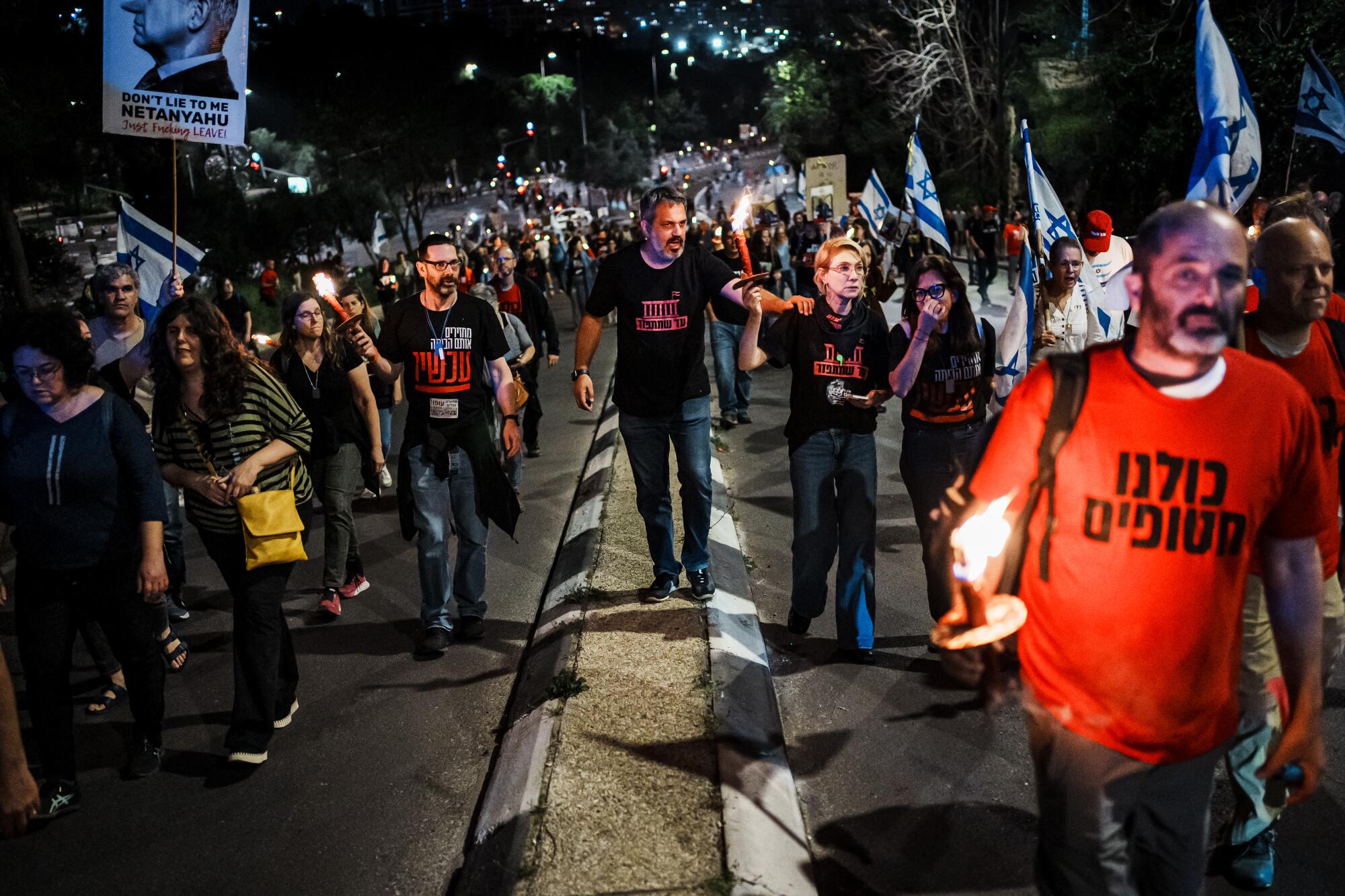
Brous is swift and slight and looks younger than her years. Her hair is long and black, falling over her tallit, which as her sermons go on — the pace sharpening, her command absolute — she sometimes removes with a slip of the shoulder. Her syllables flow from English to Hebrew, one language seeping almost unnoticed into the other. One can see a bit of a 1960s activist in her, abundant in spirit and sly and disarming in humor.
“She’s mischievous,” said Bronznick, a longtime mentor and friend. “She once set up a ping pong net on her dining room table. She wanted me to play. I wasn’t any good. She made a video of how ridiculous I looked and sent it to me. I loved it.”
In a sermon against the recent surge of book banning in schools, Brous, who asked for books instead of appliances for wedding gifts, said she read as many of the forbidden titles on LGBTQ+ and racial topics as she could. Then she noted that the Bible is filled with incest, promiscuity, prostitution and attempted rape. “It has loads of explicit sexual content,” she said. “And that’s just in the Book of Genesis. Wait till you see what happens [with] King David.”
Brous is married to David Light, co-creator of the “Zombies” franchise for Disney. The couple have two daughters and a son who are accustomed to their mother’s zeal. “I wanted to raise my kids in a Jewish community that actually reflected our values,” she said. “You cannot disentangle politics from faith and religion. Politics is really just the human condition. Are you OK living in a society, in a city, where 76,000 people sleep on the street? Are you OK with that?”
The rabbi doesn’t want anyone to be forgotten. IKAR, which translated from Hebrew means “essence,” runs on that sentiment. “I was lonely and I found acceptance here,” said Deborah Pardes, a writer and audio producer who was sitting with about 350 other congregants in the Shalhevet High School gym on South Fairfax Avenue where IKAR holds Shabbat services. “Sharon’s teaching at the most fundamental level is about belonging.”
That is the theme of Brous’ new book, “The Amen Effect: Ancient Wisdom to Mend Our Broken Hearts and World.” The work distills a philosophy that began when she was a child on vacation overseas and glimpsed for the first time the world’s deep poverty. “Why do we let that happen?” she asked her parents. “It’s not fair.” The book is about caring and showing up and listening in times of need, and building community with compassion rooted in ancient Jewish teaching that is both personal and global. Jewish history is a dialogue with God and a narrative of suffering, which, in her mind, should make Jews empathetic to the pain and injustice inflicted upon others.
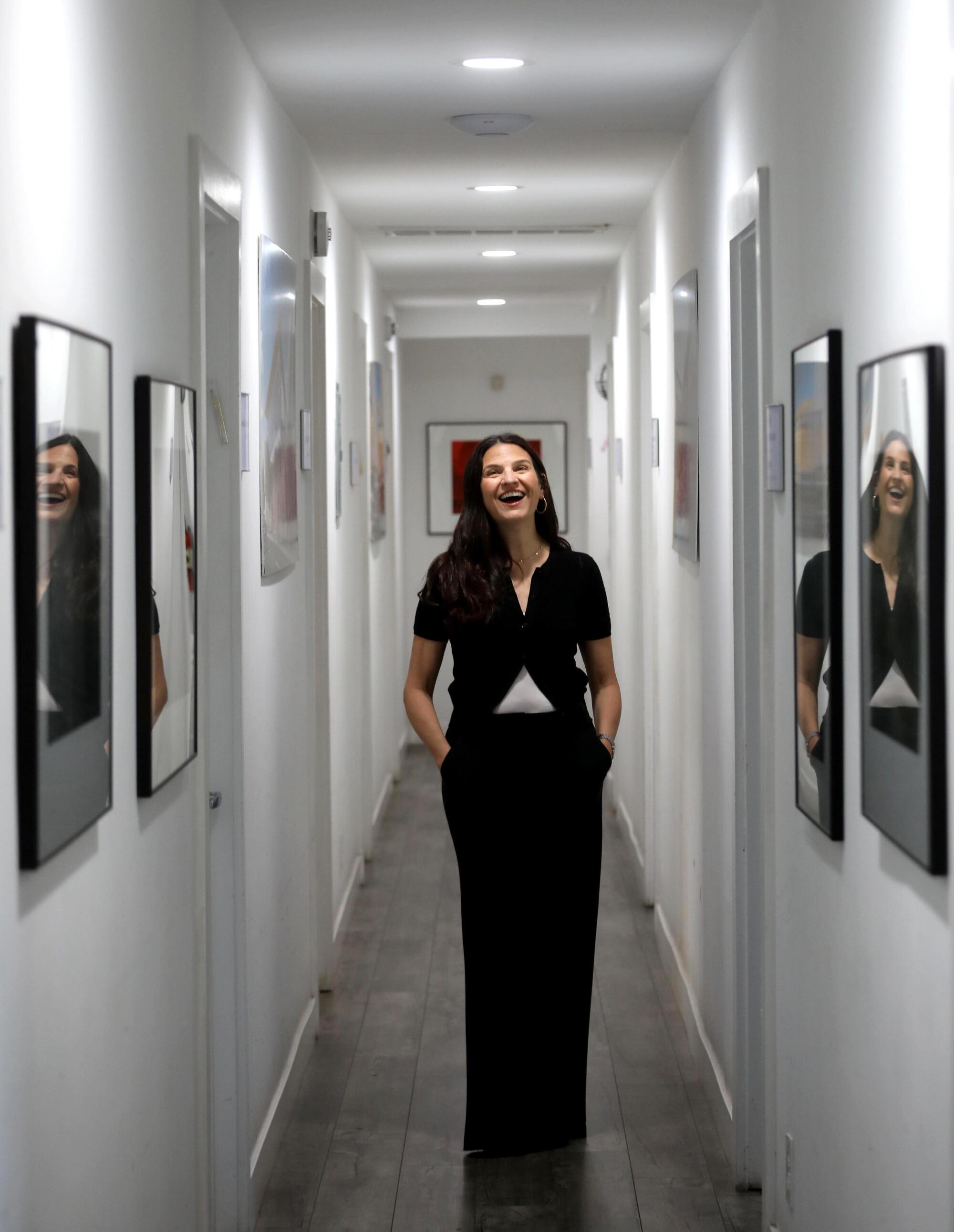
A rabbi friend offered Brous advice in relaying her message: “You’re not a magician. You’re not a superhero. You’re just a conduit for something holy.”
At a recent author’s program at the Los Angeles Public Library, Brous sat onstage in conversation with Father Gregory Boyle, founder of Homeboy Industries. The auditorium was full and carried a hum of expectation from many who looked as if they had rolled in from a kibbutz in search of enlightenment. A woman with a heart tattoo on her arm talked about powwows and “The Hobbit”; two others scrolled a phone, reading a profile of Patti Smith. The only sense of unease was police officers with security wands at the entrance, a sign of the growing animosity against Jews during Israel’s relentless bombardment of the Gaza Strip, which so far has killed more than 32,000 Palestinians.
One could see Brous’ need to convey to others the human capacity for grace and the language of wonder. One sensed she is the kind to wake in the middle of the night to jot down a thought. No moment or syllable should be wasted — now is the only time granted us. She told the audience that in an age of multiplying crises, the world needed sacred relationships and solidarity. She spoke of healing and urged people to “look at where the brokenness lives.”
Brous was a 30-year-old rabbi with a master’s degree in human rights from Columbia University — her thesis focused on how Maimonides’ rules of forgiveness could help childhood soldiers return to their homes in Sierra Leone and Liberia — when she started what would become IKAR in Los Angeles. Polls showed that many young Jews were abandoning institutional religion. “We were in a crisis,” Brous said. “They were hungry for community. But they were not finding it in the great synagogues.”
Melissa Balaban, then an assistant dean at the University of Southern California Law School, had heard about “what this young rabbi” was trying to do. The two met and laid out a plan. They held meetings in living rooms from Long Beach to Pasadena and arranged Shabbat services in different venues, including an actor’s studio. “It was completely organic,” said Balaban, IKAR’s chief executive officer, who is overseeing a more than $50-million expansion of the organization’s property on La Cienega Boulevard into a campus that will include an art studio and housing for formerly homeless seniors. “Sharon engages you in what it means to lead lives of beauty and purpose.”
IKAR’s early donations came from Brous’ parents and grandparents, Balaban’s relatives and others, including a friend who gave $180. “We didn’t know if we’d be around in six months,” Brous said. “There was no role model for what we were doing.” The young rabbi also risked being blacklisted for starting a nondenominational community that has since grown to more than 1,200 households.
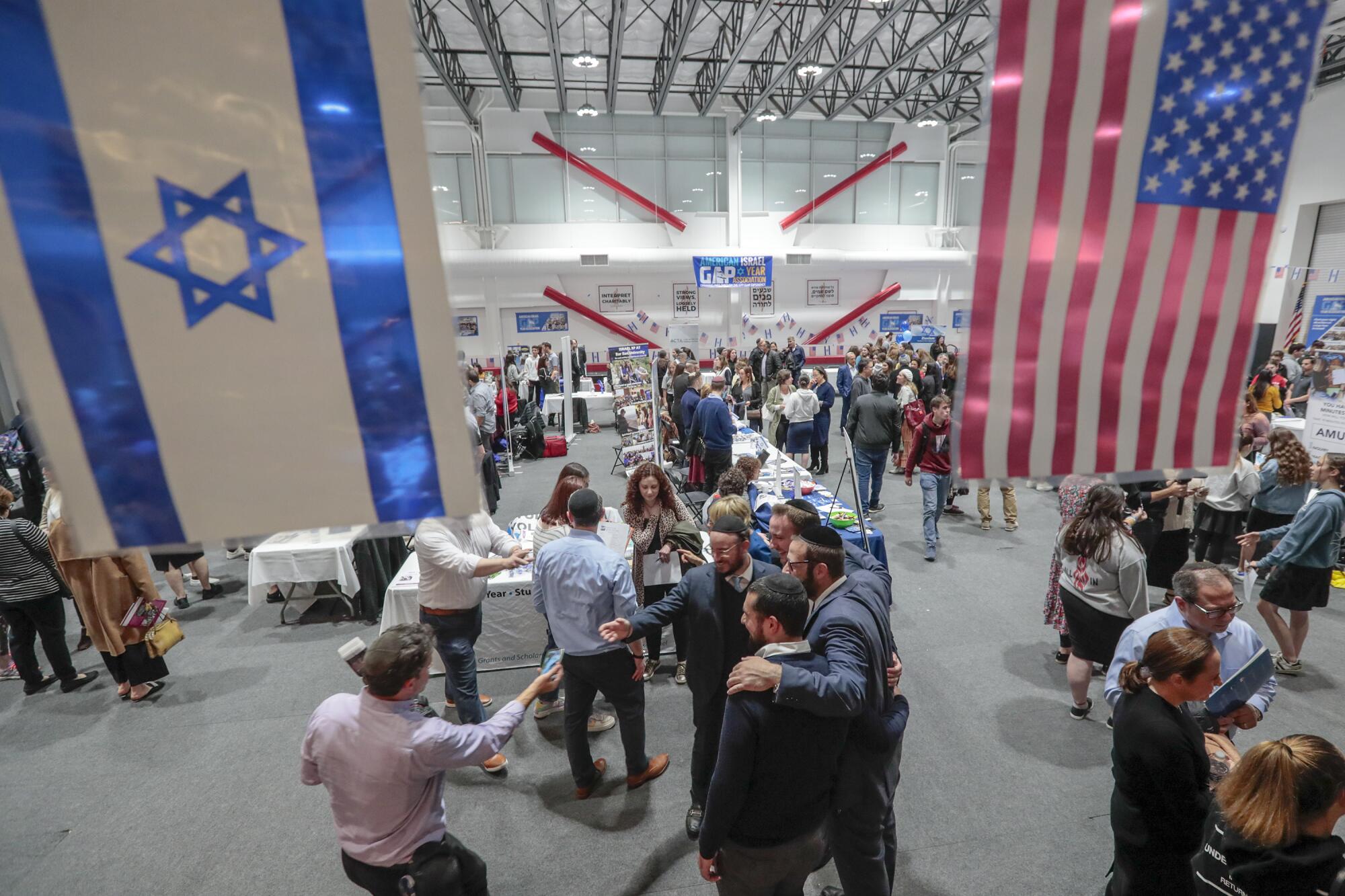
“Sharon was challenging” the establishment, Bronznick said. She added that more traditional Jewish leaders thought of Brous as, “‘we’ve let you in and now you’re telling us what we were doing wasn’t good and you have a better way.’ She wasn’t singular in this, but she was one of the great leaders transforming Jewish community life.”
IKAR had no budget for copiers. Balaban borrowed a Torah, which she drove to services and kept in her garage. Brous’ brother-in-law, a writer, offered his bungalow on the Fox lot to do her pastoral work. “It was so Hollywood,” Brous said. “But we had nothing.”
The community grew and eventually bought 300 prayer books. But she was adamant about one thing: “No pews. There will never be pews at IKAR,” said Brous, who today, at the gym, stands before a sea of folding chairs, bleachers and basketball championship banners. “Pews are the death of the spiritual life. Sometimes, you just need to get up and dance.”
IKAR’s services reverberate with the music of Hazan Hillel Tigay, who once belonged to the Jewish rap group MOT and is the son of biblical scholar Jeffrey H. Tigay. Hillel blends Ashkenazi, Sephardic and Eastern Arabic styles into ancient and contemporary rhythms, as if one had wandered into a desert tent where Peter Gabriel was opening for Ezekiel. “Sharon’s message is poetic and deeply rooted into what our ancestors were saying,” he said. “I want the music to be like a soundtrack. Sharon’s sermon is the script and the music gives emotional impact.”
The mood is decidedly un-pewlike. Small children play on the floor, jokes are told, those mourning loved ones are consoled. Brous’ father died in August, and during a recent service, she walked through the congregation, as if teacher and talisman strolling through the embraces of a large family. Her sermons are pointed, riding cadences, quoting the old books and personal anecdotes, like the one three weeks after Oct. 7, when she had returned from visiting her brother and his family in Israel, where she met those who had survived the Hamas massacre.
She was on sensitive terrain, speaking to grief-stricken followers, one of whom had family members killed in the attack, yet holding to her convictions. She spoke of how Israel’s retaliation against Hamas was a “just war.” But noted that the Jews killed in the militant attack had not even been counted when calls of “Gas the Jews” rang out in Sydney, Australia. She said that U.S. college campuses— her oldest daughter attends a university in New York —have veered from open-mindedness to intolerance. Hatred of Jews was exposed as Hamas was praised as “the resistance” by students and teachers. “What Trump gave to the white nationalists,” she said, “these professors are giving to the antisemites.”
Brous then widened the moral lens, urging her followers to understand the breadth of the tragedy. She spoke of the “shattering” loss of Palestinian lives in Gaza. “As a mother, as a daughter, as a human being, as a Jew, I am heartsick because we don’t have to choose. You either believe that every single person is an image of God or you don’t actually care about human life.” She invoked Abraham, the meaning of being a Jew, and peace with the enemy. A Jew, she said, will “hold the humanity of the Palestinians at the forefront of our hearts and minds.”
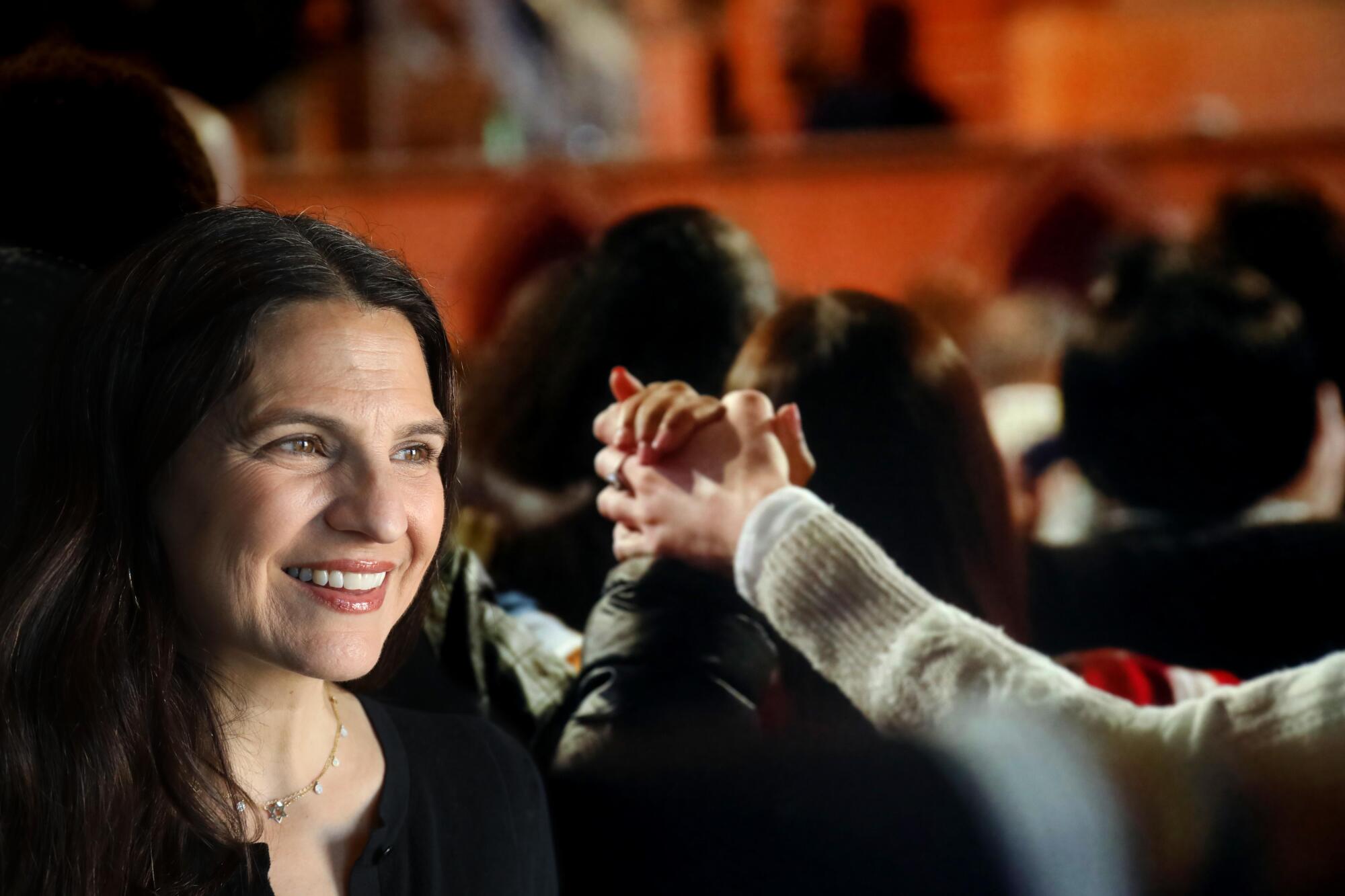
Brous, who jogs in the morning and runs late for meetings, arriving with the damp hair of one with an overbooked calendar, has noticed a change in her voice since Oct. 7. “I feel that anguish in my body,” she said, noting in a sermon in March that “my day starts with heartache.” Particularly upsetting to her, she said, was the resurgence of antisemitism and the betrayals of many on the left: “People got morally confused so fast,” she said. “Somehow Hamas, this misogynist, messianic, ultranationalist movement became a hero of the left. That’s nuts.”
What’s frightening too is the direction of America. “We’re at a very dangerous moment,” she said, an age of disinformation, conspiracies and deepening rifts over the nation’s identity. The demagogues of the far left and right — she noted Rep. Marjorie Taylor Greene’s claim in 2018 that a Jewish space laser started a California wildfire — are instigating imbalance and anger that can lead to tyranny. She quoted Hannah Arendt’s dictum that “terror can only rule absolutely” over people who are isolated and feel powerless.
“This is a time of crisis,” she said, “because we’re living in an epidemic of loneliness and isolation. It is not only a crisis for our bodies, it is a crisis for our democracy.” She later added: “Can we find our way to one another before the 2024 election?”
She spoke of the 2,000-year-old ritual of Jews walking in a circle around the Temple Mount in Jerusalem. While most flowed in one direction, the distraught and the brokenhearted walked in the other, forcing those not suffering to encounter face-to-face those in misery. Attention had to be paid in acts of consolation. Brous said she didn’t understand the text as a young rabbi. But as she comforted people over deaths, failed marriages and lost pregnancies, she said, she grasped how hard it is sometimes to confront the brokenness of another. But, she said, we must.
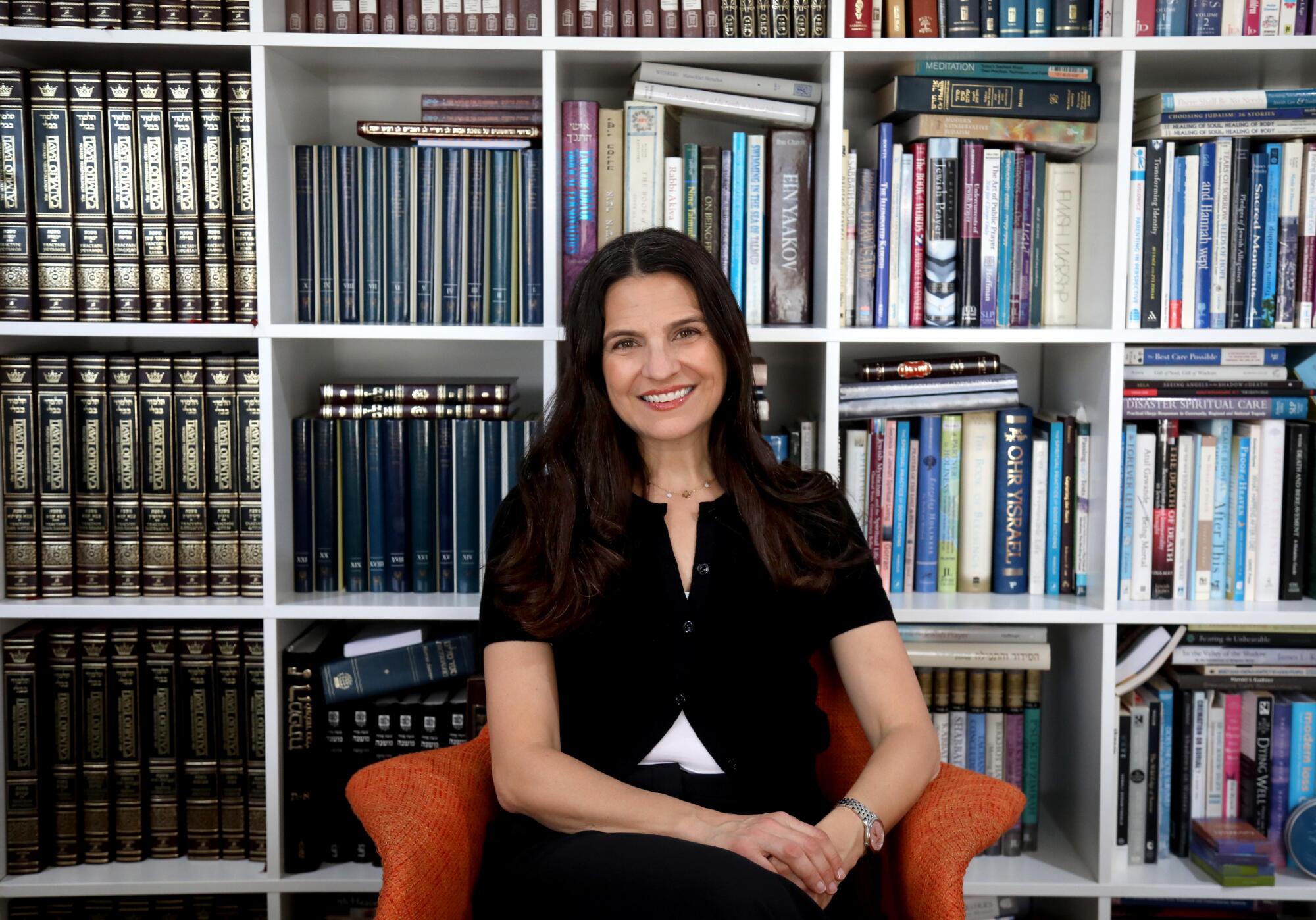
“How do we choose to see each other’s humanity?” she said. “Are we willing to go on a path of sacred accompaniment with one another?”
More to Read
Subscriber Exclusive Alert
If you're an L.A. Times subscriber, you can sign up to get alerts about early or entirely exclusive content.
You may occasionally receive promotional content from the Los Angeles Times.











